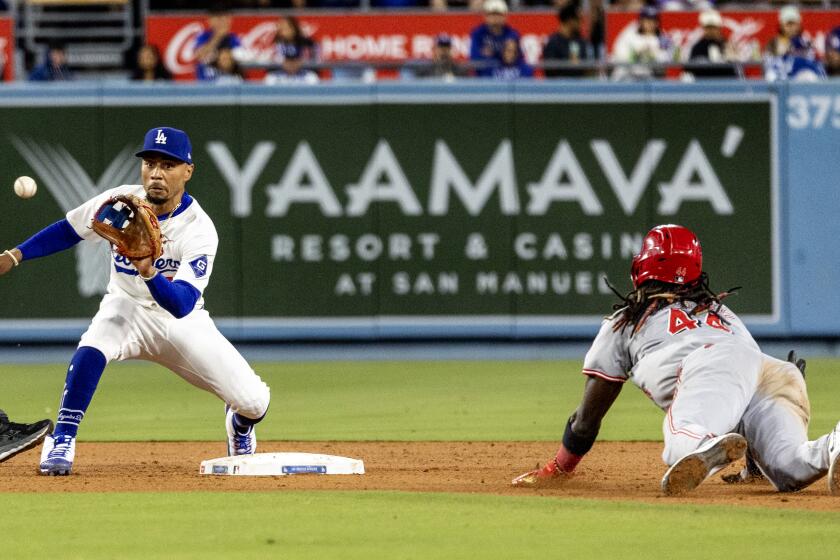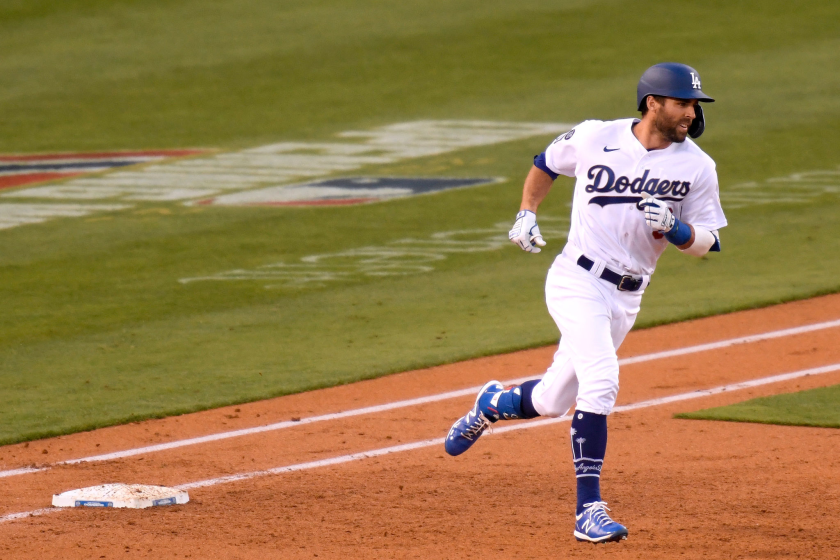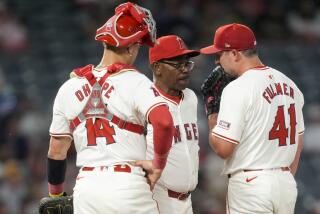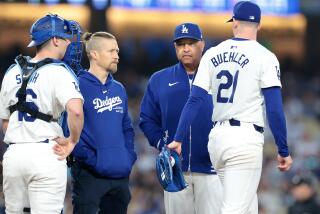Column: Corey Seager’s return to Dodger Stadium brings questions about his departure

Corey Seager apologized more than once.
He apologized when he couldn’t, or wouldn’t, explain why he’s hit in the playoffs.
“I don’t have a good answer for you on that one,” he said. “I’m sorry.”
Seager apologized again when he declined to revisit his departure from the Dodgers.
“We’ll move on,” he said. “Sorry.”
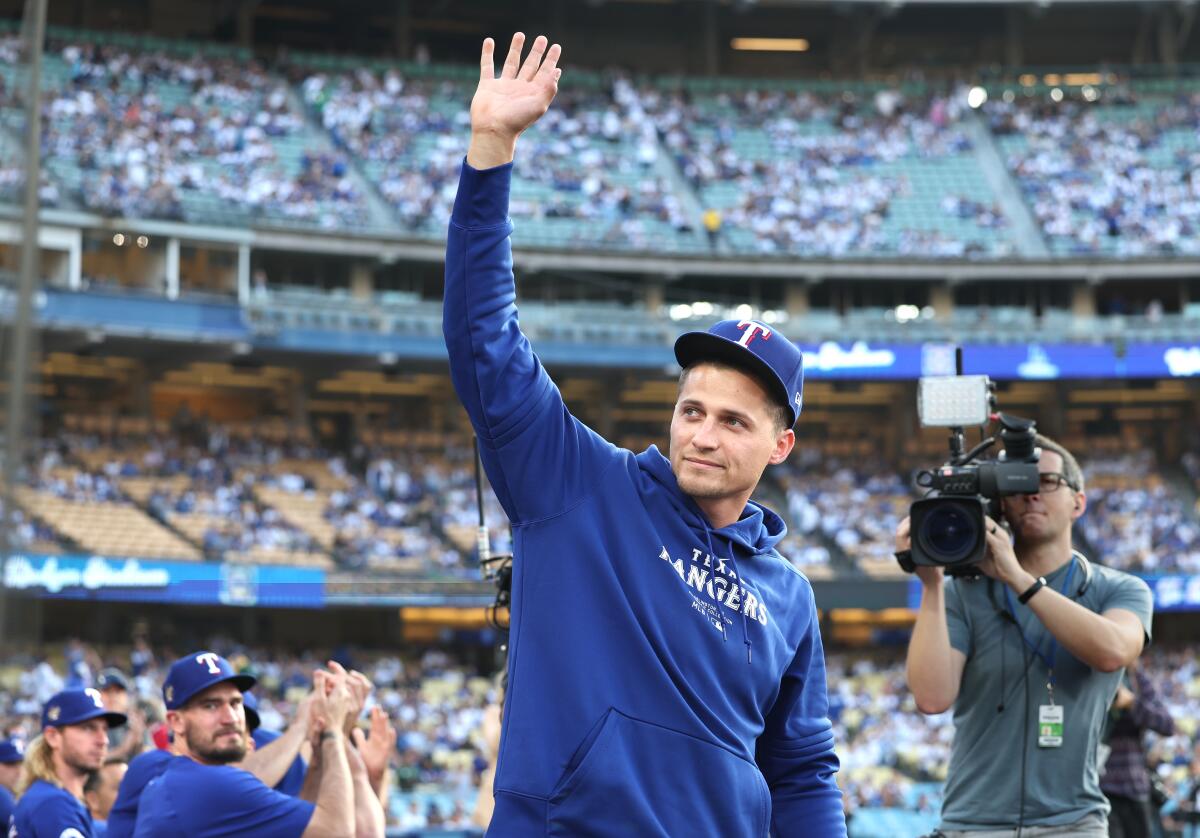
Now a Texas Rangers shortstop, the 30-year-old Seager returned to Dodger Stadium on Tuesday to face his former team for the first time.
He was never one to draw attention to himself when he played here. He wasn’t about to start now.
Seager, who was sidelined in the series opener because of a strained hamstring, had to understand the subtext of each question.
In the pandemic-shortened 2020 season, he was the World Series most valuable player when the Dodgers won their only title in the last 36 years. Their half-hearted attempt to sign him to a long-term deal resulted in them losing him to the upstart Rangers three winters ago, however.
Sooner or later, the Dodgers will have to make several determinations regarding Mookie Betts and the shortstop position.
Last year, the Rangers won the World Series and Seager was again the MVP.
The Dodgers? Without Seager in their lineup, their hitters have choked in each of the last two Octobers.
Seager is in the third year of a 10-year, $325-million contract with the Rangers, and the Dodgers’ refusal to offer him a comparable deal marks the greatest fork in the road for them under Andrew Friedman’s leadership.
He was their Mr. October.
They have won only one playoff game since he left.
That raised questions about whether their current players are built for the postseason spotlight. Friedman pushed back against the suggestion last year in the wake of their humiliating first-round elimination against the Arizona Diamondbacks, basically arguing there was no such thing as a “postseason player.”
“Look at Corey Seager,” Friedman said, pointing to how Seager didn’t perform well in the 2019 and 2021 playoffs.
Manager Dave Roberts did what he could Tuesday to downplay the effect of Seager’s defection on the Dodgers.
“As far as us,” Roberts said, “it still takes more than one player. I think, collectively, we just haven’t been great the last couple of years offensively.”
The Dodgers probably wouldn’t have traded for Trea Turner at the 2021 trade deadline if they hadn’t anticipated Seager’s exodus. They probably wouldn’t have converted outfielder Mookie Betts to playing shortstop if they hadn’t lost Seager.
Then again, they probably wouldn’t have signed Freddie Freeman before the 2022 season if they didn’t have to replace Seager’s left-handed bat in the middle of their lineup.
For his part, Seager was gracious his homecoming, at which the Dodgers paid tribute to him with a highlight package on their video scoreboard.
“Spent a lot of time here,” Seager said. “This organization kind of raised me. Drafted here. Kind of made me the man I am today. Taught me the game of baseball. Made a lot of friends, made a lot of buddies. Had a lot of good times out there, so all those memories kind of flash back as you pull in.”
An edition of “Random Thoughts” includes a few things that just aren’t the same when you go to Dodger Stadium
Seager said he spent part of his team’s day off Monday in Manhattan Beach with Dodgers utility man Chris Taylor. Seager marveled at Betts’ ability to move to shortstop and revealed that he remains in contact with his fellow 2020 postseason hero.
He credited the Dodgers for helping him build a winning culture with the Rangers, who lost 102 games the season before they signed him.
“They taught me everything I knew,” Seager said of the Dodgers. “How to win. How to do things the right way. It’s a first-class organization. You try to bring that to another first-class organization. It’s all those little things that you’ve learned throughout the year that you try to spread and talk about.”
Predictably, Seager wasn’t as revealing when questioned about the lengths to which the Dodgers went to re-sign him.
In his final spring training with the Dodgers, the team offered Seager an eight-year, $250-million deal, which he rejected.
At that point, did he figure 2021 would be his final season with the Dodgers? Or did he remain hopeful they could work out something?
“You’re always hopeful,” Seager said. “That’s a long time ago, though. I can’t really remember how it went.”
Everything worked out for Seager, who signed one of the most lucrative contracts in baseball history and won another World Series. The Dodgers still are waiting for the day they can say everything worked out for them as well.
More to Read
Are you a true-blue fan?
Get our Dodgers Dugout newsletter for insights, news and much more.
You may occasionally receive promotional content from the Los Angeles Times.

